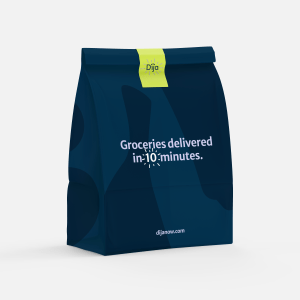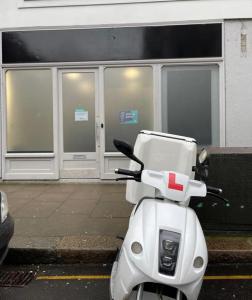Dija, the London-based grocery delivery startup, is officially launching today and confirming that it raised £20 million in seed funding in December — a round that we first reported was partially closed the previous month.
Backing the company is Blossom Capital, Creandum and Index Ventures, with Dija seemingly able to raise pre-launch. In fact, there are already rumours swirling around London’s venture capital community that the upstart may be out raising again already — a figure up to £100 million was mooted by one source — as the race to become the early European leader in the burgeoning “dark” grocery store space heats up.

Image Credits: Dija
Over the last few months, a host of European startups have launched with the promise of delivering grocery and other convenience store items within 10-15 minutes of ordering. They do this by building out their own hyper-local, delivery-only fulfilment centres — so-called “dark stores” — and recruiting their own delivery personnel. This full-stack or vertical approach and the visibility it provides is then supposed to produce enough supply chain and logistics efficiency to make the unit economics work, although that part is far from proven.
Earlier this week, Berlin-based Flink announced that it had raised $52 million in seed financing in a mixture of equity and debt. The company didn’t break out the equity-debt split, though one source told me the equity component was roughly half and half.
Others in the space include Berlin’s Gorillas, London’s Jiffy and Weezy, and France’s Cajoo, all of which also claim to focus on fresh food and groceries. There’s also the likes of Zapp, which is still in stealth and more focused on a potentially higher-margin convenience store offering similar to U.S. unicorn goPuff. Related: goPuff itself is also looking to expand into Europe and is currently in talks to acquire or invest in the U.K.’s Fancy, which some have dubbed a mini goPuff.
However, let’s get back to Dija. Founded by Alberto Menolascina and Yusuf Saban, who both spent a number of years at Deliveroo in senior positions, the company has opened up shop in central London and promises to let you order groceries and other convenience products within 10 minutes. It has hubs in South Kensington, Fulham and Hackney, and says it plans to open 20 further hubs, covering central London and Zone 2, by the summer. Each hub carries around 2,000 products, claiming to be sold at “recommended retail prices”. A flat delivery fee of £1.99 is charged per order.
“The only competitors that we are focused on are the large supermarket chains who dominate a global $12 trillion industry,” Dija’s Menolascina tells me when I ask about competitors. “What really sets us apart from them, besides our speed and technology, is our team, who all have a background in growing and disrupting this industry, including myself and Yusuf, who built and scaled Deliveroo from the ground up”.
Menolascina was previously director of Corporate Strategy and Development at the takeout delivery behemoth and held several positions before that. He also co-founded Everli (formerly Supermercato24), the Instacart-styled grocery delivery company in Italy, and also worked at Just Eat. Saban is the former chief of staff to CEO at Deliveroo and also worked at investment bank Morgan Stanley.
During Dija’s soft-launch, Menolascina says that typical customers have been doing their weekly food shop using the app, and also fulfilling other needs, such as last-minute emergencies or late night cravings. “The pain points Dija is helping to solve are universal and we built Dija to be accessible to everyone,” he says. “It’s why we offer products at retail prices, available in 10 minutes — combining value and convenience. Already, Dija is becoming a key service for parents who are pressed for time working from home and homeschooling, as one example”.
Despite the millions of dollars being pumped into the space, a number of VCs I’ve spoken to privately are skeptical that fresh groceries with near instant delivery can be made to work. The thinking is that fresh food perishes, margins are lower and basket sizes won’t be large enough to cover the costs of delivery.
“This might be the case for other companies, but almost everyone at Dija comes from this industry and knows exactly what they are doing, from buying and merchandising to data and marketing,” Menolascina says, pushing back. “It’s also worth pointing out that we are a full-stack model, so we’re not sharing our margin with other parties. In terms of the average basket size, it varies depending on the customer’s need. On one hand, we have customers who do their entire grocery shop through Dija, while on the other hand, our customers depend on us for emergency purchases e.g. nappies, batteries etc.”
On pricing, he says that, like any retail business, Dija buys products at wholesale prices and sells them at recommended retail prices. “Going forward, we have a clear roadmap on how we generate additional revenue, including strategic partnerships, supply chain optimisation and technology enhancements,” adds Menolascina.

Meanwhile, TechCrunch has learned that prior to launching its own app, Dija ran a number of experiments on takeout marketplace Deliveroo, including selling various convenience store items, such as potato chips and over-the-counter pharmaceuticals. If you’ve ever ordered toiletry products from “Baby & Me Pharmacy” or purchased chocolate sweets from “Valentine’s Vows,” you have likely and unknowingly shopped at Dija. Those brands, and a number of others, all delivered from the same address in South Kensington.
“Going direct to consumer without properly testing pick & pack is a big risk,” Menolascina told me in a WhatsApp message a few weeks ago, confirming the Deliveroo tests. “We created disposable virtual brands purely to learn what to sell and how to replenish, pick & pack, and deliver”.
Early Stage is the premier ‘how-to’ event for startup entrepreneurs and investors. You’ll hear first-hand how some of the most successful founders and VCs build their businesses, raise money and manage their portfolios. We’ll cover every aspect of company-building: Fundraising, recruiting, sales, product market fit, PR, marketing and brand building. Each session also has audience participation built-in – there’s ample time included for audience questions and discussion.






















